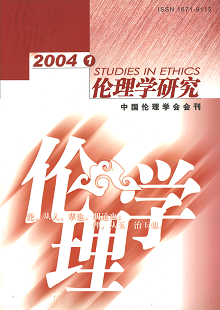|
|
The Vice——a Special Phenomenon of Morality
WU Canxin
2004(1):
100-105.
Since ancient times, the evil has been existed objectively in our social life, but to this day, it has not been very ample for people to study the evil. In the world of today, all sorts of crimes is increasingly happening, theyseverely damage the social interest and people's interest and destroy the civilization and order of society. The human decrease all sorts of crimes in the mostdegree as possible as they can, there include the means of the evil in these crimes. In order to apply this means of the evil, it is very necessary for us to study and apply the evil. The emphasis of this dissertation raises rough opinionsfrom the angles of view of the significance of studying the evil, the basic rules, the mechanism of controlling the evil and so on, so as to arousing the attention of the academic circles to this problem.
|



